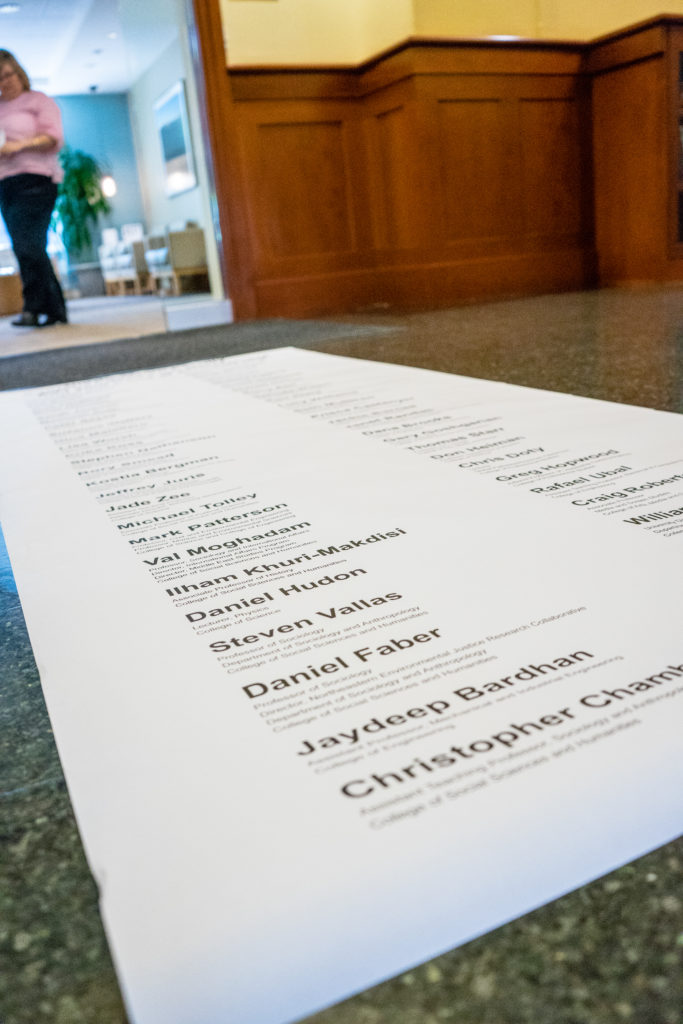Faculty Senate considers divestment resolution
The list of faculty members who signed DivestNU’s open letter in support of fossil fuel divestment. The letter was delivered to Provost James C. Bean last fall./Photo by Lauren Scornavacca
March 22, 2017
The Faculty Senate has yet to vote on whether it will adopt a resolution asking university administration to be more transparent about the university’s investments in fossil fuels, but many of its members supported the idea at an informal meeting March 15.
Dana Brooks, a professor of electrical and computer engineering, said most Senators expressed interest in passing a resolution similar to the one DivestNU, a student group that advocates for fossil fuel divestment, proposed to them at a March 1 Senate meeting.
DivestNU’s proposed resolution would urge the administration to analyze how much of the university endowment is invested in fossil fuels, explore options for divestment and share their findings with the Northeastern community.
The university does not have any direct investments in the fossil fuel industry, but a portion of the school’s endowment is invested in commingled funds, which include some holdings in energy-related companies.
Brooks said he expects the Senate will decide whether to pass a resolution in early April. Resolutions passed by the Faculty Senate, which is made up of 30 elected professors and 10 appointed administration members, do not make changes at the administrative level.
Brooks said he expects that if the Senate decides to pass a resolution satisfying DivestNU’s hopes, it would pass a “sentiment of the Senate” resolution. These types of resolutions express the feelings of the faculty to the administration but do not compel the administration to implement change, Brooks said.
“The power of the Faculty Senate is a power of persuasion and pressure,” Brooks said.
University spokesperson Matthew McDonald did not say whether the administration would accept the proposed resolution if passed by the Senate. He said the university remains committed to sustainability.
“The university has been consistent in its robust commitment to sustainability, and about its forward-looking strategy, which includes a $25 million investment of endowment funds in environmental sustainability,” McDonald said in an e-mail to The News.
During the March 1 Faculty Senate meeting, DivestNU members James DeCunzo and Anna Sorokina presented a PowerPoint to the Senate and handed out pamphlets explaining the definition of divestment, related economics and university’s stance on divesting.
DeCunzo, a sophomore politics, philosophy and economics major, told the Senate that divestment would not necessarily be economically harmful to the school. Portfolios with and without fossil fuel investment perform similarly, he said.
“The incremental risk of divesting [from fossil fuels] shows no significant statistical difference from other divestments,” DeCunzo said.
DeCunzo presented examples of a number of more than 100 colleges that have partially or completely divested from fossil fuels. Sorokina, a sophomore environmental studies major, described divestment as an opportunity to become a leader in sustainability.
An open discussion between Faculty Senate members and DivestNU members followed the presentation. Some Senators asked clarifying questions, while others talked about their personal feelings on divestment. Sorokina said most were sympathetic to DivestNU’s cause.
“The majority was supportive,” Sorokina said “They were just bringing up points about how it doesn’t make sense for Northeastern to make climate research and at the same time be involved in companies that disregard that science—the science of climate change.”
One senator expressed concern that divesting from fossil fuel companies for ethical reasons might open up the door to divesting from other industries because of moral objections, Sorokina said.
DeCunzo said he enjoyed the open discussion because it gave DivestNU members the ability to speak with some experts in fields related to climate change and divestment.
“It was great to have the support and work together as a community to talk about, in my opinion, one of the most important issues in my lifetime and in the lifetimes of future generations,” he said.
Brooks initially suggested that the Senate Agenda Committee invite DivestNU to speak at a Senate meeting. Brooks said he is not very involved with the DivestNU organization, but he did sign its faculty open letter.
“I think that this is something universities should do out of responsibility to society,” Brooks said. “You can’t not make a decision about this. You decide to divest or you decide to keep investing, so you can’t stay out of it politically.”
DivestNU members have often expressed frustration with the university administration’s lack of response to the issue of divestment. DeCunzo cited multiple actions by the Northeastern community pushing divestment, such as faculty signatures on a petition, legislation passed by the Student Government Association and the Social Impact Council’s suggestion for divestment after President Joseph E. Aoun created the group—composed of students, faculty and staff—to address issues of social impact.
“What is the actual process? There is no transparency with working with this administration,” DeCunzo said.
Both DivestNU members and Brooks said they believe Northeastern should divest from fossil fuels in order to act as a leader of other universities.
“To me, this is a real opportunity and it would be too bad if we passed up on the opportunity to be a leader,” Brooks said. “To be a leader, you have to take these kinds of risks, you have to take these kinds of stands.”
Editor’s Note: Anna Sorokina was previously an arts & entertainment editor and columnist at The Huntington News.







